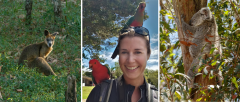
by Nathaniel Whelan
When her supervisor connected her with some former colleagues in Brisbane, Australia, Allison Binley jumped at the chance to conduct additional research abroad and expand the scope of her original thesis.
Allison is a Carleton PhD candidate in the Department of Biology whose work focuses on conservation science. To finance her international activities, she applied for the Mitacs Globalink Research Award (GRA), a funding program that supports research collaborations between Canada and select partner organizations and/or eligible countries. She was successful, and in September 2022, after 20+ hours and two layovers, she landed in Brisbane.
Thirteen Carleton students have been approved for or awarded the GRA in the 2022/23 fiscal year. Speaking about this grant, Allison said:
“The Mitacs funding is a big reason I was able to undertake my research. So much is done online these days, but in certain contexts it really cannot replace in-person interactions. This is particularly true when you’re an early career scientist just starting to make connections with collaborators who are in a time zone that is 14 hours different from yours. Living in Australia for several months is expensive though, so this grant really helped with that. It was easy to apply and there was a lot of support from both Mitacs and Carleton in pushing the application forward.”
Allison spent 3 and a half months conducting research at the University of Queensland, where she worked with Dr. Jonathan Rhodes and other local conservation researchers, for which Australia has a fantastic international reputation.
The bulk of her time abroad was spent working on a chapter of her thesis that investigates the trade-offs of learning more information vs acting on what we already know. Learning more, through biodiversity monitoring for example, can help conservationists make more effective decisions, but they often fail to consider the associated costs and how it can ultimately lead to worse outcomes than simply acting based on limited information. Her research demonstrates that by using available existing data, scientists have the opportunity to redistribute more resources from monitoring to action, resulting in better outcomes for biodiversity.
Allison’s career evolved naturally from her love of nature. She has worked and volunteered on a wide variety of projects, including wildlife rehabilitation, captive breeding, pinniped sensory and cognitive ecology, coral reef restoration, and preventing the spread of invasive species, all before starting her graduate studies back in 2018.
While these experiences were rewarding, they were also an eye-opener to the harsh realities of conservation work on the ground. Allison’s research now focuses on how to make conservation science more effective by accounting for logistics, such as operational costs and limited budgets, and trying to find realistic ways to mitigate anthropogenic pressures in human-dominated landscapes.
When asked how her experience abroad impacted her research, Allison said:
“The ecology and conservation issues in Australia are often vastly different to what I am familiar with in North America and so they offered me a whole new perspective on how to conduct my research. Many things I knew to be true about conservation here didn’t apply as well to these different contexts, which turned out to be an incredibly valuable learning experience.
“Additionally, it was great to get out of my bubble and meet different conservation scholars. It reminded me of going to conferences and being exposed to all sorts of new research, except this time I was fortunate enough to spend a lot more time with them and become even more familiar with their work.”
But it wasn’t all serious business. During her stay in Australia, Allison set aside plenty of time to go hiking and birding. She also spent two weeks travelling up the coast, visiting K’gari (a World Heritage-listed island) and snorkeling off of Great Keppel Island.
Having previously done a year abroad in Australia during her undergrad and a four month research internship in Germany, Allison is no stranger to international travel. After defending her thesis in May, she plans on accompanying her partner to Scotland where he will be conducting research at the University of St. Andrews, also on a Mitacs GRA grant.
After the summer, Allison will be starting a Rose Postdoctoral Fellowship at the Cornell Lab of Ornithology. Much of the work she plans to do there evolved directly from her research in Australia.
To learn more about conservation science, you can follow Allison on Twitter.